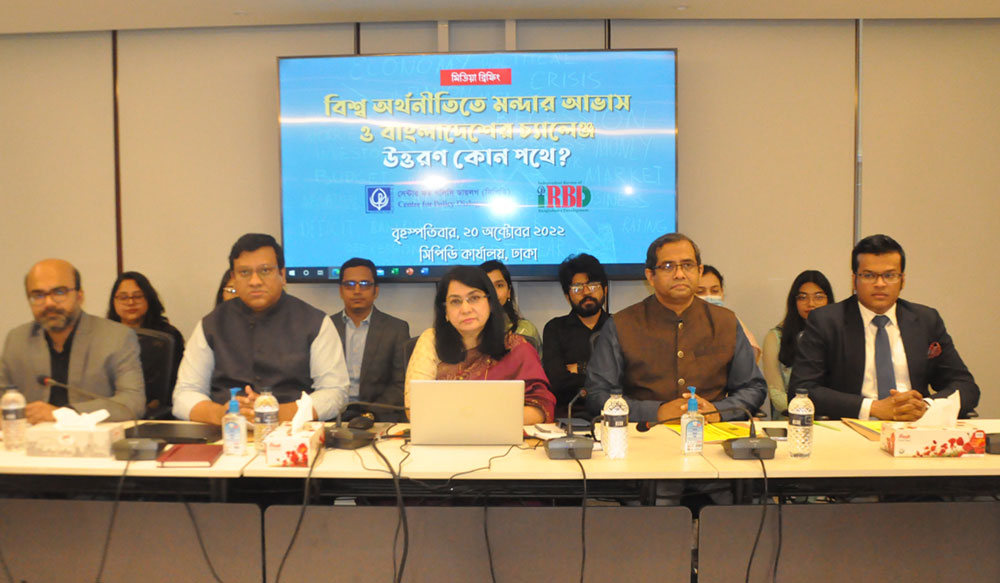
Global economy is currently facing a number of challenges such as rising inflation, Russia-Ukraine war and the already existing impacts induced by COVID-19 pandemic. In view of the global crisis, the emerging and continuing challenges in Bangladesh on both domestic and external fronts are being aggravated. At present, Bangladesh is facing crises at least in terms of seven issues—climate change, COVID-19, Russia-Ukraine war, dollar, energy, inflation, and food.
In the above context, the Centre for Policy Dialogue (CPD) under its flagship programme Independent Review of Bangladesh Development (IRBD) organised a media briefing titled “Slowdown in Global Economy and Challenges for Bangladesh: How to Tackle?” on Thursday 20 October 2022. Dr Fahmida Khatun, Executive Director of CPD, delivered the keynote presentation on behalf of the IRBD team. While presenting its analyses, CPD offered a number of policy suggestions to address the challenges, particularly manifested in: (i) inflationary pressure, (ii) power and energy crisis, and (iii) external sector.
In light of the unrelenting inflation, Dr Fahmida Khatun underscored that an updated consumption basket should be formulated for calculating CPI inflation. While the government has no other option but to opt for loans from IMF and World Bank, the associated conditionalities should be publicly available for review and discussion before the signing agreement—sequencing the implementation of the envisaged reforms will also be critical. The Bangladesh Competition Commission should adopt a strong stance against cartels and a zero-tolerance policy towards collusive practices. The Minimum Wage Board should consider increasing the minimum wages in all industries so that workers can afford basic food.
Currently, Bangladesh is facing inflationary pressure from two aspects, that is, a rise in prices for food items as well as interferences in the supply chain owing to the Ukraine crisis. This is increasing the risk of food crisis. To curb this emerging food crisis, the National Board of Revenue (NBR) should immediately consider removing the advanced income tax (AIT), advance tax (AT) and regulatory duty (RD) on all imported essential food items. The government should prepare for maintaining adequate food stock not only through better agricultural production, but also through importing food. Food storage facilities and buffer stocks should be developed to increase resilience to crisis.
In the external sector, growth of export earnings is above the strategic annual target with underlying disquieting trends such as the decrease in the overall export earnings. The growth of import payments is also being tempered down. While outward migration registered impressive growth, remittance inflow growth slowed down. Balance of payments (BOP) is sliding into further uncomfortable position. Forex reserve continues to be a grave concern due to deficit in overall balance of payments. Market based floating exchange rate remains the only policy option. To deal with the turbulences in the external sector, the infrastructural need and announced policy support for export-oriented industries must be ensured. The import-related recent restrictive measures should be continued, and the utilisation of foreign-aided projects should be prioritised. The central bank should refrain from further depletion of forex reserve, particularly in view of the recent debate regarding the estimation methodology and pursue a floating exchange rate policy.
In her presentation, Dr Fahmida recommended that macroeconomic stability should be the primary focus of Bangladesh’s economic policy. She mentioned, inflationary pressure should be suppressed for the disadvantaged groups, the demands of energy and power sector should be met, and the exchange rate volatility should be tamed. The government should form a committee comprising the representatives of the Prime Minister’s Office, Ministry of Finance (MoF), Ministry of Planning, Ministry of Commerce, Ministry of Power, Energy and Mineral Resources (MoPEMR), Ministry of Food, Ministry of Agriculture, Bangladesh Bank and NBR, and they should work in a coordinated manner.
“Energy and power sector confronts multiple challenges, both short- and medium-term in nature,” said Dr Khondaker Golam Moazzem, Research Director, CPD. He said that the power generation and supply crisis is likely to continue unless sufficient fuel is supplied. Even though the power crisis may be eased in the medium term, the long-term tension will continue as the added generation capacity is mainly import based, putting a huge burden of capacity payment on the shoulder of BPDB. Moreover, CPD opined that BPC should consider downward revision of diesel, octane, and petroleum prices given the global oil prices are declining over time. Dr Fahmida mentioned, the government should put more emphasis on exploration of gas in order to reduce the over-dependence on imported fossil-fuel. Renewable energy needs to be more emphasised and prioritised to reduce the dependency on imported fuels.
Mr Towfiqul Islam Khan, Senior Research Fellow, Mr Muntaseer Kamal, Research Fellow, CPD, and Mr Syed Yusuf Saadat, Research Fellow, CPD were also present in the discussion. The briefing was followed by an open-floor Q&A session with journalists from both print and electronic media.


